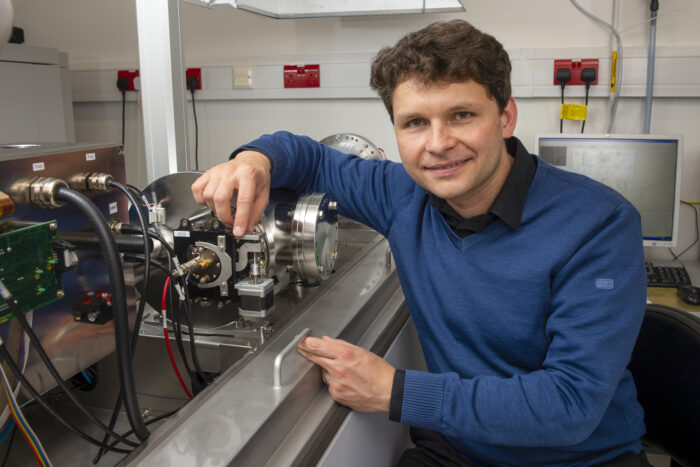
Holger Kramer, Head of the LMB’s Mass Spectrometry facility, died on Tuesday 23rd August 2022, aged 43. He suffered a brain haemorrhage from a ruptured aneurysm. He was a highly interactive, inquisitive and engaged scientist, who had worked in mass spectrometry and proteomics for over 14 years and published around seventy papers on a range of topics.
Holger was a chemist by training, having obtained a degree in chemistry at the University of Marburg, Germany and then a MSci in chemistry at the University of Birmingham, UK. He completed a PhD on the Synthesis of Glycoproteins and C-linked Glycopeptides, with Professor Benjamin G. Davis, at the Department of Organic Chemistry, University of Oxford, UK. It was here that Holger developed a keen interest in the use of mass spectrometry to address biological problems.
Remaining in Oxford, in 2007 Holger became a postdoctoral research assistant with Professor Benedikt Kessler at the Nuffield Department of Medicine. His research focused on the application of proteomics approaches to the investigation of early events in HIV-1 infection. He also worked on chemical proteomics strategies for the study of cellular deubiquitinases and collaborated on studies of cellular signalling. In charge of quantitative proteomics analysis within the laboratory, Holger was involved in working on multiple, concurrent projects and collaborating with a wide range of researchers in the biomedical sciences.
Holger then became proteomics core facility scientist at the University of Oxford (Department of Physiology, Anatomy and Genetics) in 2010. Here he was solely responsible for the delivery of biological mass spectrometry analysis techniques using an Ion Trap LC-MS/MS system, a MALDI-TOF/TOF instrument and FPLC equipment, thereby enabling collaboration with and provision of expertise to research groups within the Wellcome Trust-funded OXION consortium.
In 2016, Holger became Head of Biological Mass Spectrometry and Proteomics at the MRC London Institute of Medical Sciences (MRC LMS). As well as leading on service delivery, he also oversaw the expansion of the facility, including making decisions on major investment in technology (three high resolution mass spectrometers, one triple quadrupole LC-MS and one GC-MS system) and the recruitment of new facility staff to support the expansion. In addition, he was responsible for developing analytical approaches for proteomics analysis and the introduction and implementation of metabolite analysis and quantification within the facility.
In October 2021, Holger joined the LMB as Head of the Mass Spectrometry Facility. He led a small team providing quantitative high-resolution analysis of proteins and peptides to help solve otherwise difficult or intractable problems in biomedical research. The facility’s strengths, in structural proteomics and top-down biological proteomics, are central to most of the LMB’s research activities. Holger also recently participated in a LMB film about the facility, explaining about the work and why he found it so rewarding.
Manu Hegde, Joint-Head of the LMB’s Cell Biology Division, commented: “Holger’s enthusiasm for mass spectrometry, from the finest technical details to the future possibilities in this field, shone through in all of his interactions with colleagues across the Lab”.
Holger was actively engaged with the wider proteomics and mass spectrometry community and regularly contributed to scientific meetings and conferences in the field. He was also active in postgraduate training and assessment and had significant teaching experience at the University of Oxford. For this, he was recognised as a Fellow of the Higher Education Academy (FHEA) in 2017. He was a member of the MRC Harwell training coordination committee since 2018, and a member of the British Mass Spectrometry Society (BMSS), British Society of Proteome Research (BSPR) and Royal Society of Chemistry (RSC).